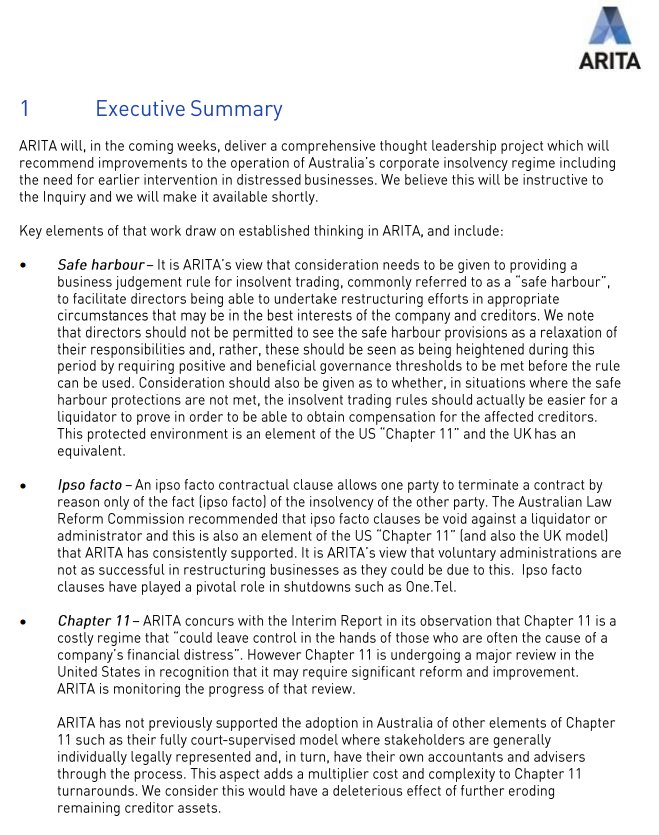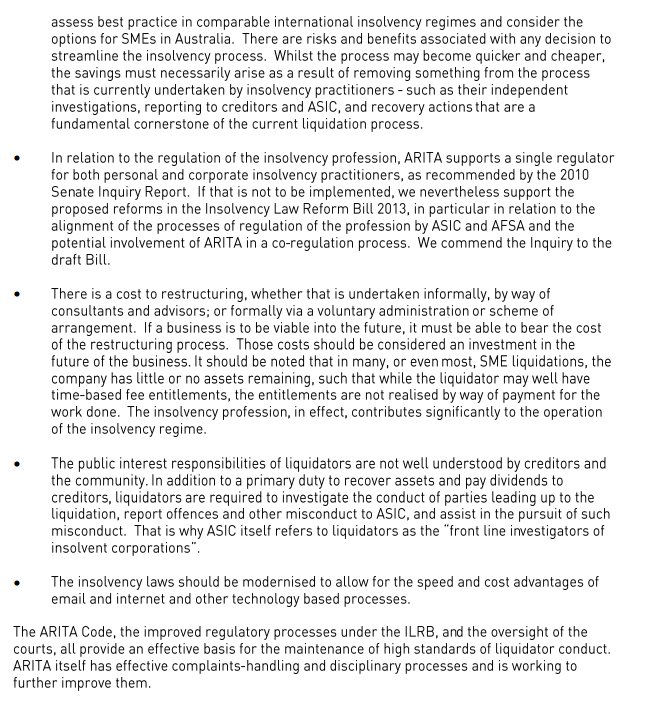AUSTRALIAN SENATE INQUIRY INTO LIQUIDATORS AND ADMINISTRATORS
TREASURY DEPARTMENT’S ANSWERS TO QUESTIONS ON NOTICE
Circa March 2010
Senator Williams
‘Can you take this on notice for me: how many countries actually have receivers? I believe in recent times in the UK they have actually banned receiverships. Could you fond out whether the UK has banned receivers? Could you also tell me how many countries around the world actually have a system of receivership and appointing receivers?’
Answer:
“Administrative receivership is the process in the United Kingdom where in the event of a default an a loan, a tender may be entitled to appoint an insolvency practitioner (i.e. an administrative receiver) who may have the control of the whole or a substantial part of a company’s property and wide powers over its business; for the purpose of realising the lenders security. In many ways, an administrative receivership is akin to a receiver and manager under Australian law.
“In the United Kingdom, the Enterprise Act 2002 (UK) restricts the use of administrative receivership. Subject to exceptions, rights to appoint an administrative receiver are limited to those who have a floating charge that was contractually agreed prior to 15 September 2003.
” Treasury notes that Professor David Brown appeared before the inquiry in Adelaide on 9 April 2010 and Treasury refers to Professor Brown’s explanation of the current law in relation to receiverships in the United Kingdom.
“Non‑administrative receiverships are still available in the United Kingdom. The availability of receiverships is legislated by the Insolvency Act 1986(UK).
“Receivership in one form or another is present in most modern insolvency regimes such as Canada, United States of America and New Zealand.”
Senator Fierravanti‑Wells
‘I would be really interested to know from Treasury’s perspective how much tax alone is foregone in corporate failures on a per annum basis.’
Answer:
“The Australian Taxation Office (ATO) has advised that during the financial year ending 30 June 2008, an estimate of $1.06 billion in taxation was forgone as a consequence of known corporate failures. The estimated amount for the financial year ending 30 June 2009 was $1.3 billion. These amounts relate to known or reported taxation liabilities and do not include unpaid or uncollected superannuation liabilities.”
Senator Cameron
‘You may want to take this on notice but could you advise the committee of how many companies operate within Australia under that $10 million gross annual turnover threshold?’
Answer:
” ASIC advise that there are approximately 1.7 million companies in Australia, with approximately 32,000 required to report under Chapter 2M of the Corporations Act. Of those that report, approximately 12,000 are proprietary companies and approximately 20,000 are public companies.
“Small proprietary companies are generally not required to prepare financial reports, unless requested by their shareholders or ASIC. Even if required to prepare the reports, small proprietary companies are not required to lodge the reports on the public register. For the purpose of these provisions, a ‘small proprietary company’ is one which satisfies two of the following three criteria: having less than 50 employees, less than consolidated revenue greater than $25 million or assets under $12.5 million.
“Excluding the approximately 20,000 public companies, almost all of the companies that do not lodge financial reports have consolidated revenue of less than $25 million.”
Senator Fierravanti‑Wells
‘Following on from Senator Cameron’s question, in terms of sanctions that are imposed in this area on company directors, where does Australia rank? Could you take that on notice. For example, the stigma in this country in relation to bankruptcy and insolvency has disappeared and certainly is not comparable to the severity of sanctions that are imposed on directors in other countries where passports are removed and those sorts of things. We are nowhere near that. So, if you could take it on notice and give us a comparison, 1 would be interested in the answer.’
Answer:
“Australia has a robust system of corporate governance that is well recognised internationally.
“The principal duty of the board of directors is to act in the interests of the company as a whole. This means acting in the best interests of members, having regard to their future as well as current interests. Every member of a company has certain rights by virtue of their membership. These rights are conferred by statute and by the company’s own constitution. The Corporations Act protects members of the company from unjust treatment and provides a range of mechanisms for members to protect their rights and interests as members of the corporation.
” The Government has put in place a principles‑based framework for corporate governance to protect the integrity of the market, facilitate commerce and industry, and maintain investor confidence in Australia’s companies.
“The Corporations Act contains a range of duties setting out certain minimum obligations and responsibilities directors must fulfil. These include:
- the duty to act in good faith; the duty to act in the best interests of the company;
- the duty to exercise their powers with appropriate care and diligence that is reasonable in all of the circumstances;
- the duty to not make inappropriate use of inside information;
- the duty to not misuse their position for their own or a third party’s possible advantage (or to the possible detriment of the company); and the duty to avoid insolvent trading.
“Directors face penalties of $200,000 for civil contraventions of these provisions, and can be disqualified from managing corporations. Directors may also be required to pay compensation. Criminal contraventions face maximum fines of $220,000 or imprisonment for 5 years, or both.
“In relation to passports, where ASIC is conducting an investigation, a prosecution, or a civil proceeding against a person, the Court under section 1323 of the Corporations Act can require a person to deliver up to the Court their passport.
“Given differing legal frameworks and institutional arrangements, regulatory arrangements are not readily amenable to international comparison.”
Senator Cameron
‘Has Treasury done any analysis of the implications of phoenix companies for the overall economy? You may have to take this question on notice: does Treasury see phoenix companies as a problem generally in the economy?’
Answer:
“Phoenix activity involves the evasion of tax and other liabilities through the deliberate, systematic and sometimes cyclic liquidation of related corporate trading entities. Minister Sherry released a proposals paper Action against Fraudulent Phoenix Activity in November 2009. We refer the committee to the overview and analysis of the problem of phoenix company behaviour set out in that paper.”
END OF POST
To comment, click READ MORE


